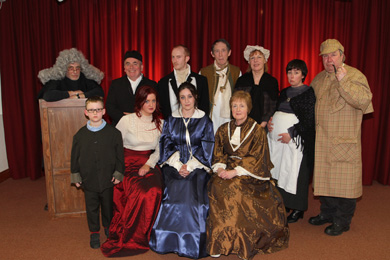EUROPEAN Heritage Open Days are to be marked at Down County Museum in Downpatrick with special living history presentations which will recreate life in the old gaol.
European Heritage Open Days celebrate the wonders of Northern Ireland’s built heritage and uncover some of the unique stories associated with particular buildings ranging from great houses to industrial sites. Down County Museum will be joining in the celebration by offering visitors the chance to sample the atmosphere of the eighteenth century County Gaol and meet some of its inhabitants.
[caption id="attachment_41888" align="alignleft" width="390"] Get into the real history of Down County Museum. Pictured are staff and friends during a Murder Mystery Night held earlier this year.[/caption]
Get into the real history of Down County Museum. Pictured are staff and friends during a Murder Mystery Night held earlier this year.[/caption]
Living history events have proved a very popular way of bringing the stories of prisoners and gaolers to life and on Saturday 14 and Sunday 15 September, staff from the Museum will be re-enacting the experiences of some of the more colourful inmates of the Gaol. Presentations will be held regularly from 1.30pm to 4.30pm.
Down County Museum is located in the restored buildings of the old Gaol of Down. The Gaol opened in 1796 and held hundreds of prisoners convicted of a range of offences from highway robbery and treason to pickpocketing, insurance fraud and vagrancy. Over the period from 1796 to 1830 an extraordinary collection of people were held here from leading United Irishmen like Rev Samuel Barber, to child prisoners such as James Smith who was sentenced to death for forgery and Jane Armstrong who was transported for theft.
The County Gaol was also the site of public executions and those hanged at the doors included William Gaddis, in 1818 for murder and theft; Margaret Cleland hanged in 1830 for fatally wounding her sister in law; and Thomas Russell, the Gaol’s most famous prisoner hanged for treason in 1803.
As well as some of the extraordinary stories associated with prisoners, visitors can also learn more about the gaolers and turnkeys, some of whom also exhibited criminal tendencies. Gaoler Joseph Robinson was removed for ‘corrupt practices’ while turnkey Owen White was sacked for aiding and abetting escapes.
This is sure to be an informative and enjoyable event for all the family and will provide visitors with fascinating information on how the gaol operated and how prisoners were treated in the past.
Admission to the event is free and is suitable for all ages.
]]>






















